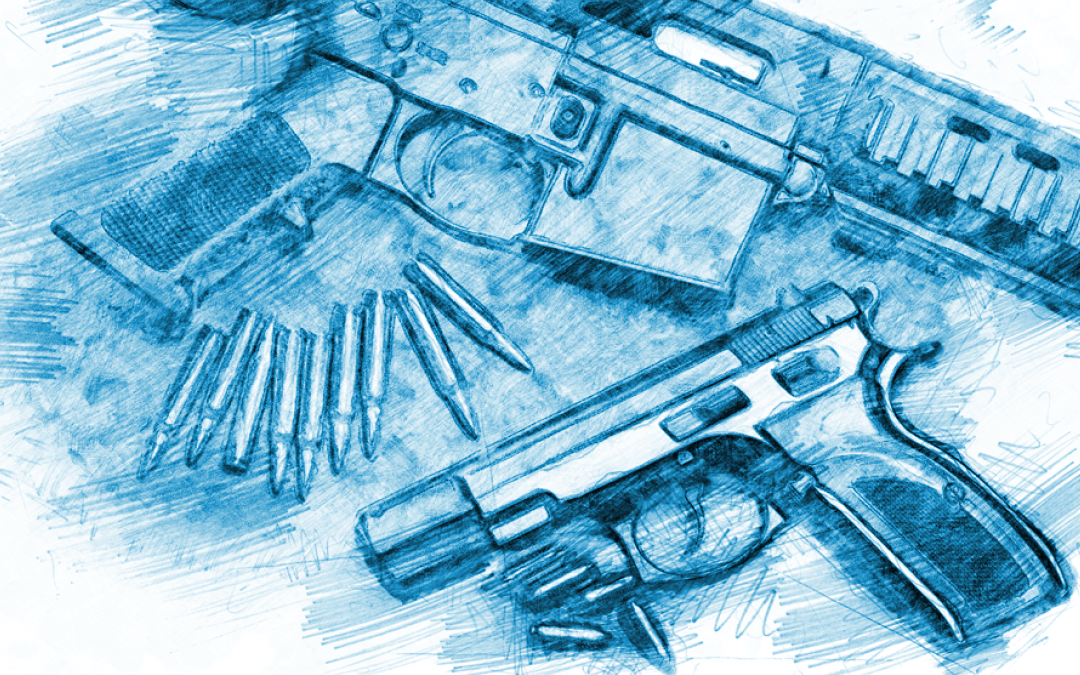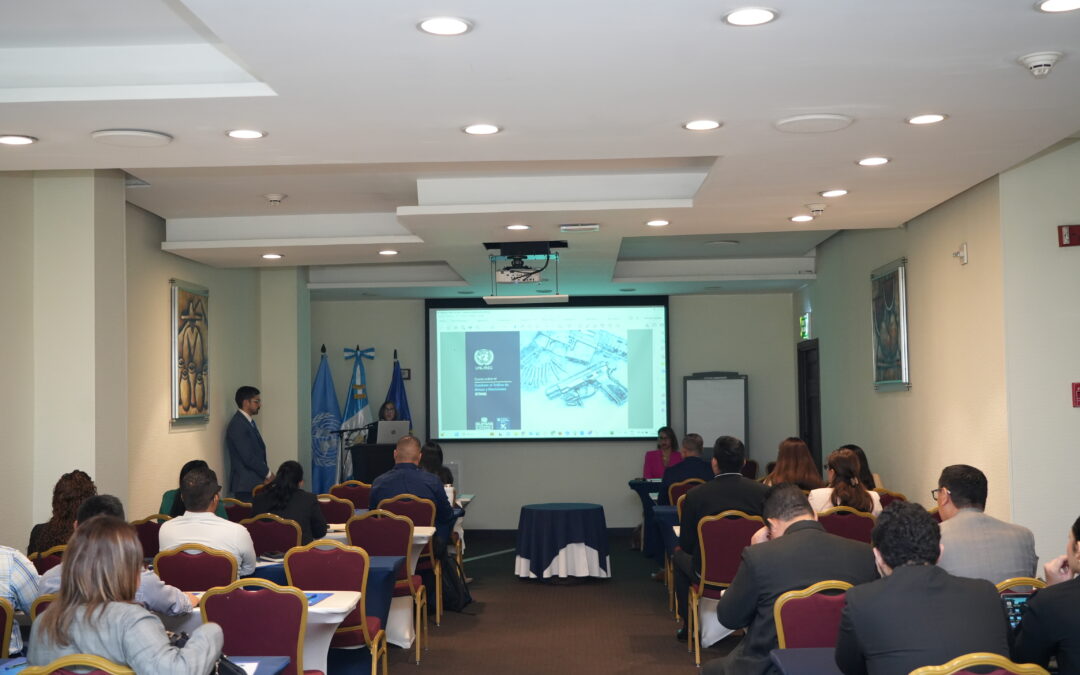
Jul 18, 2023 | Conventional Arms Programme
From 18 to 21 July 2023, officials from the Firearm Licensing Authority, the Department of Correctional Services, the Institute of Forensic Science and Legal Medicine, the Jamaica Constabulary Force, the Jamaica Defence Force, the Ministry of National Security, and the Jamaica Customs Agency participated in the virtual Physical Security and Stockpile Management (PSSM) Training Workshop. This workshop sought to strengthen State capacities to reinforce national mechanisms to reduce and prevent the diversion of conventional weapons and ammunition and improve law enforcement capacity to secure stockpile facilities.
As a result of this workshop, 23 national officers are now more knowledgeable on international standards and best practices in physical security and stockpile management, marking and recordkeeping. The presentations addressed the relevance of national mechanisms and measures to reduce and prevent the diversion of firearms and ammunition from national stockpiles.
The PSSM Training Workshop forms part of the technical assistance provided by the United Nations Regional Centre for Peace, Disarmament and Development in Latin America and the Caribbean (UNLIREC) in the framework of the “Preventing Diversion of Conventional Arms and Ammunition in the Caribbean” project, funded by the United States of America.
This course also contributes to Goal 4 of the Caribbean Firearms Roadmap which sets out to “Systematically decrease the risk of diversion of firearms and ammunition from government- and non-government-owned arsenals”, and supports regional efforts to prevent illicit trafficking in firearms and ammunition and armed violence in the Caribbean.

Jul 10, 2023 | Conventional Arms Programme
July 2023. The CARICOM Implementation Agency for Crime and Security (IMPACS) and The United Nations Regional Centre for Peace, Disarmament and Development in Latin America and the Caribbean (UNLIREC), continue to coordinate organizational efforts under the Caribbean Firearms Roadmap to Prevent the Illicit Trafficking and Proliferation of Arms and Ammunition.
Regular meetings are held amongst partner agencies to align efforts, develop coordinated strategies and share lessons learned in relation to the implementation of the Caribbean Firearms Roadmap. Roadmap Partner agencies include the Organization of American States (OAS), the World Customs Organization (WCO), the United Nations Office on Drugs and Crime (UNODC), INTERPOL and the Small Arms Survey.
At the most recent partner meeting held on 10 July, CARICOM IMPACS formally launched a partner coordination platform which was developed using in-house expertise. This platform was developed to address the need for an established repository of information and allows various partner agencies to input activities as well as outline intended outcomes. This will ensure a complementary strategy in achieving the targets set out as priorities by Caribbean countries.
The Caribbean Firearms Roadmap was adopted in July 2020 by 15 Caribbean States and the Dominican Republic with a view to making the region safer by addressing the illicit proliferation of firearms and ammunition. International partners have since supported Caribbean States through the provision of expertise and best practices towards the adoption of sustainable solutions, consistent with international norms and the Caribbean context, to control, eradicate, prevent, and prosecute the illicit possession, proliferation and misuse of firearms and ammunition.
These meetings and the newly launched platform are both mechanisms that support progress towards achieving the goals of the Caribbean Firearms Roadmap. This process has shown itself to be essential in the integrated regional strategy for a safer Caribbean by preventing and combatting armed violence and the illicit proliferation of weapons.

Jul 10, 2023 | Conventional Arms Programme
From 10 July to 4 August, 30 national x-ray operators, including 5 women, will participate in the second Interdicting Small Arms, Ammunition, Parts and Components Course (ISAAPC) in Guatemala, organised by the United Nations Regional Centre for Peace, Disarmament and Development in Latin America and the Caribbean (UNLIREC), in coordination with the Guatemalan Ministry of Foreign Affairs.
In this second edition of the GuatemalaISAAPC , officials from the General Directorate of Civil Aeronautics, the Department of Tax Administration, the Division of Ports, Airports and Border Posts (Dipafront) of the National Civil Police and COMBEX IM of Guatemala have been invited to attend both virtual and in-person sessions.
Faced with the constantly evolving issue of arms and ammunition trafficking in the region (, UNLIREC seeks to support the efforts of Guatemala and all Latin American and Caribbean States to combat and prevent the illicit trafficking of firearms, their parts, components, ammunition, and explosives through postal deliveries, parcels, packages, and luggage. ISAAPC was developed as a specialised training for X-ray operators who carry out control and inspection tasks at security checkpoints.
Over the next few days, the group of participants will strengthen their abilities in the identification of weapons, their parts andcomponents, as well as ammunition and explosives. This course is taught by a combination of theoretical and practical methodology. They will receive practical training on a specialised platform to improve their ability to identify threats such as weapons, their parts and components, and ammunition, as well as improvised explosive devices, or IEDs.
To complement and enrich this training and foster inter-agency collaboration,participants from different national institutions will also share their experiences in the detection of firearms and ammunition through x-rays.
The Course on Interdicting Small Arms, Ammunition, Parts and Components (ISAAPC) is part of the technical assistance provided by UNLIREC in the context of the project Support to the implementation of sub-regional, regional and global instruments and frameworks related to small arms control and ammunition management in Latin America and the Caribbean, funded by the Federal Republic of Germany.

Jul 6, 2023 | Conventional Arms Programme
June 2023. The Department of Public Security of the Organization of American States (DPS/OAS) and the United Nations Regional Centre for Peace, Disarmament and Development in Latin America and the Caribbean (UNLIREC) have initiated the development process of the Central American Road Map to Prevent the Illicit Trafficking and Proliferation of Arms and Ammunition. Based on this initiative, Central American States will establish shared priorities, objectives and actions aimed at increasing the effectiveness of actions to tackle these issues.
In October 2022, the OAS General Assembly requested the DSP/OAS, in collaboration with UNLIREC, to develop a proposal for a Central American Road Map to promote coordinated strategies in preventing and combating the illicit trafficking and proliferation of arms and ammunition. With the financial support from the European Union, both OAS and UNLIREC will be pursuing the development of this sub-regional initiative, which will be integrated into the Central American Security Strategy (ESCA).
For the development process of the Road Map, a series of national and sub-regional meetings are planned with Central American countries and the Dominican Republic. The Road Map process initiated with a series of inter-institutional meetings at the national level addressed to representatives of different State entities with responsibilities in arms control and combatting its illicit trafficking.
During these meetings, both OAS and UNLIREC briefed the authorities on the background, objectives, scope, methodological aspects and next steps for the development of the Road Map. Participating entities learnt also about existing sub-regional road maps and action plans in the Caribbean, the Western Balkans and the Economic Community of West African States (ECOWAS) region. In turn, national authorities shared their expectations, needs and priorities on this topic and emphasized the importance of advancing on such initiative, taking into account the transnational nature of illicit firearms trafficking, which requires coordinated strategies at both national and sub-regional levels.
These first meetings mark the beginning of the consultation and development process of the Central American Road Map to Prevent the Illicit Trafficking and Proliferation of Arms and Ammunition. This process will have the technical accompaniment of the DSP/OAS and UNLIREC, with the financial support of the European Union.

Jun 20, 2023 | Conventional Arms Programme
From 20 June – 29 June, 2023, close to thirty (30) law enforcement officers and public officials from Suriname will enhance their skills on gender-sensitive firearms-related criminal investigations with the support of the United Nations Regional Centre for Peace, Disarmament and Development in Latin America and the Caribbean (UNLIREC), in collaboration with The Directorate National Security of Suriname for the virtual Specialised Course on Firearms Investigations from a Gender Perspective (FIGP).
The FIGP is aimed at strengthening participants’ technical knowledge on gender-sensitive firearms-related criminal investigations. Members of The Korps Police Suriname, Attorney General’s Office, Directorate National Security and Military Police are participating in the course.
During the opening, the representative of National Coordination of the Ministry of Public Security of Suriname,Ms Jennifer Harnandan said that “Almost one third of the number of killings in the country are a result of domestic violence, the majority of which are perpetrated against women”. In view of this and other facts, she also highlighted that “This course will allow for collaboration between actors from the Suriname Police Force, National Security and police prosecutors.”
The course will train participants to apply gender perspectives to criminal firearms investigations as a complementary method of analysis, thereby contributing to formulating hypotheses that are free from stereotypes, as well as to identifying evidence of gender-based violence, and ensuring the respect of human rights of the victims and survivors. The use of firearms to perpetuate violence against women can not only lead to fatalities, but the weapons are also used to threaten, intimidate, and coerce women.
This activity is part of the Canada funded project in support of the implementation of the Caribbean Firearms Roadmap.
With initiatives such as this one, the Government of Suriname, with the technical assistance of UNLIREC, demonstrates its commitment to the prevention and elimination of violence against women.

Jun 5, 2023 | Conventional Arms Programme
From 5 to 9 June 2023, the United Nations Regional Centre for Peace, Disarmament and Development in Latin America and the Caribbean (UNLIREC), alongside the Ministry of Foreign Affairs of Guatemala (MINEX) of Guatemala, held the Combating Trafficking in Arms and Ammunition (CTAM) Course. This course brought together 30 officers from the Directorate General of Civil Aviation (DGAC), the Directorate General of Arms and Ammunition Control of the Ministry of National Defence (DIGECAM), the Directorate General of Civil Intelligence (DIGICI), the Public Prosecutor’s Office (MP), Minex Guatemala, the Superintendence of Tax Administration (SAT), as well as representatives of the Institute of Education for Sustainable Development (IEPADES).
The course commenced with opening remarks by representatives of UNLIREC and the Ministry of Foreign Affairs, who highlighted the importance of the course, as demonstrated by the significant proliferation of illicit arms in the country.
The CTAM is a specialised course that provides both theoretical and practical knowledge on the global and regional stateof arms trafficking; methods of illicit arms manufacture; systems for the control and documentation of international transfers of firearms and ammunition, including brokering, as well as tools and mechanisms for international cooperation against firearms trafficking.
In this CTAM session, national representatives presented the characteristics, trends and challenges of arms trafficking in Guatemala, and shared some of the measures and policies implemented to tackle this problem. In addition, INTERPOL also presented its Firearms Programme, sharing the main resources available for the registration and tracing of weapons, and highlighting the main results of its recent operations in Latin America.
Strengthening national capacity through a specialised course such as the CTAM, contributes to the efforts of Guatemalan institutions to combat and prevent arms trafficking.
This course took place in the context of the project in support of the implementation of UNLIREC’s Programme of Action on Small Arms and Light Weapons, funded by the European Union.






